What is gastric bypass?
Gastric bypass is a bariatric surgery used to help patients with weight loss. The surgery makes changes to the stomach and small intestine. These changes alter the way the body digests food and results in weight loss.
The Roux-en-Y gastric bypass surgery is considered the “gold standard” of bariatric surgery and is the most widely performed weight loss surgery in the world.
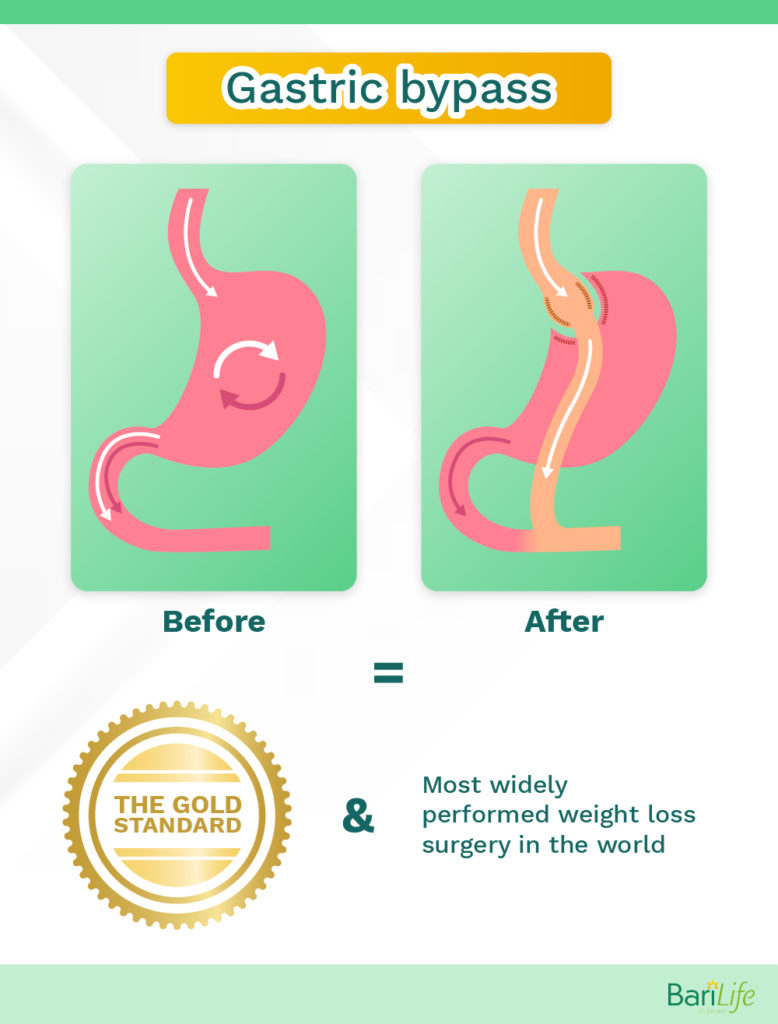
During the surgery, a small pouch is created in the stomach and attached to a section of the small intestine called the Roux limb. The procedure changes the path through which food is digested and bypasses a large portion of the small intestine.
The gastric bypass procedure promotes weight loss because it limits the amount of food that the stomach can hold, reduces the number of calories and nutrients that are digested and absorbed, and alters hormones in the gut that regulate hunger and appetite.
The Roux-en-Y procedure results in successful weight loss for most patients.
How much weight will I lose from gastric bypass surgery?
Most people considering gastric bypass or weight loss attempts of any kind want to know how much weight they will lose. When discussing how much weight will be lost from gastric bypass, it’s important to give more context to the subject.
In bariatrics, a term often used is excess weight loss. Excess weight is determined by subtracting your ideal body weight from your current body weight. A formula based on height and body frame is used to determine ideal body weight.
When you determine your excess body weight, you can estimate how much weight you can expect to lose from surgery. Most patients experience about 70% weight loss of their excess body weight after receiving Roux-en-Y gastric bypass surgery.
In the first month after gastric bypass, people can expect to lose about 17% of their excess weight. There are several things that contribute to this rapid weight loss in the first month after surgery:
- Reduced appetite – after gastric bypass, people generally aren’t hungry, so calorie intake is very low
- Specialized 4-phase diet – the first phase of the post-op diet is only liquids, and is the most calorie-restricted phase of the diet
- Motivation is highest in the beginning – people are often most motivated to make changes at the start of a new weight loss journey
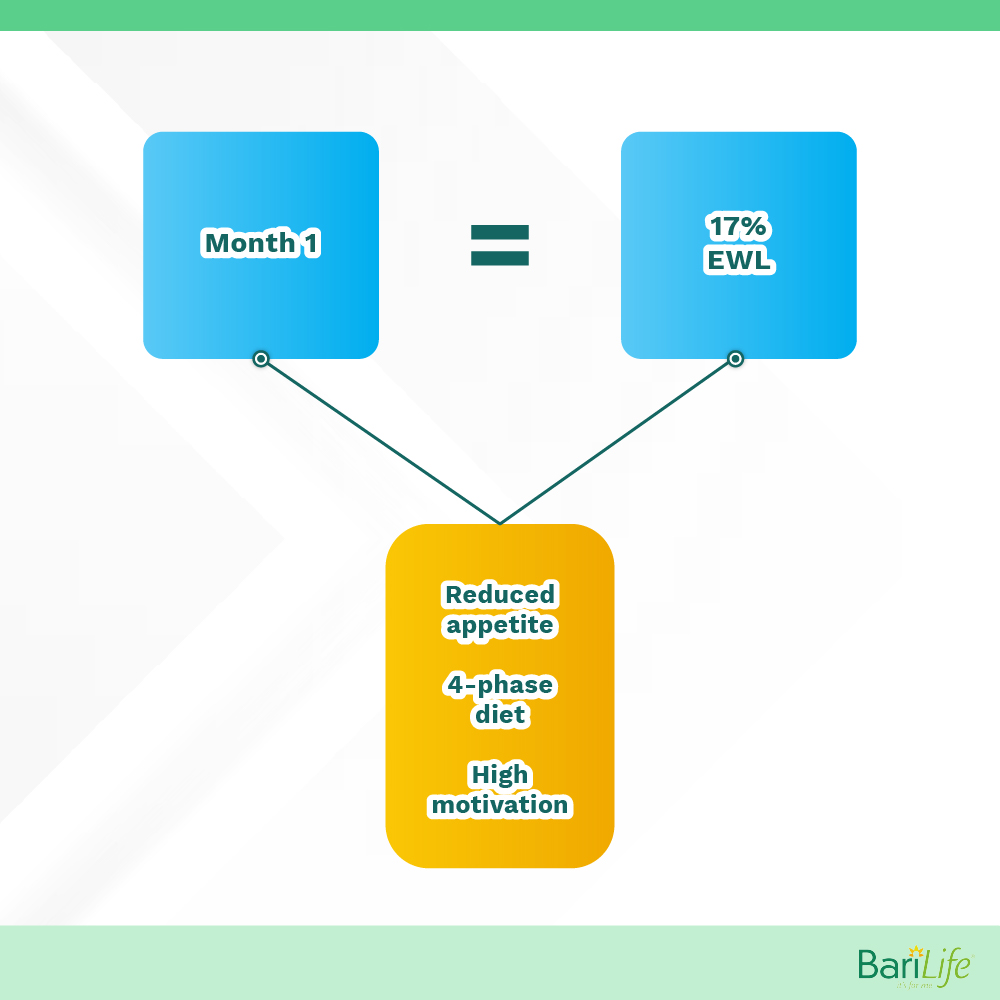
For about 6 months after the surgery, most patients will continue to lose weight fairly easily. This 6 months post-op is known as the “honeymoon phase.” Motivations are high, calories are restricted after surgery, and the excess weight seems to just fall off.
Although it can be exciting to lose so much weight so quickly after surgery, it is important to stay focused on long-term lifestyle changes that will help you continue the weight loss and maintain it for life.
Will I experience weight loss plateaus or weight regain after gastric bypass?
Most people are motivated to make healthy changes in the beginning and are consistent with their diet and physical activity. That fact helps aid in initial weight loss after gastric bypass.
Over time, motivation often fades, which can result in stalling of weight loss and weight regain. Significant weight regain after gastric bypass surgery occurs in about 20% of patients long-term. This happens for various reasons, but can often be prevented through consistency of lifestyle behaviors such as proper diet and exercise.
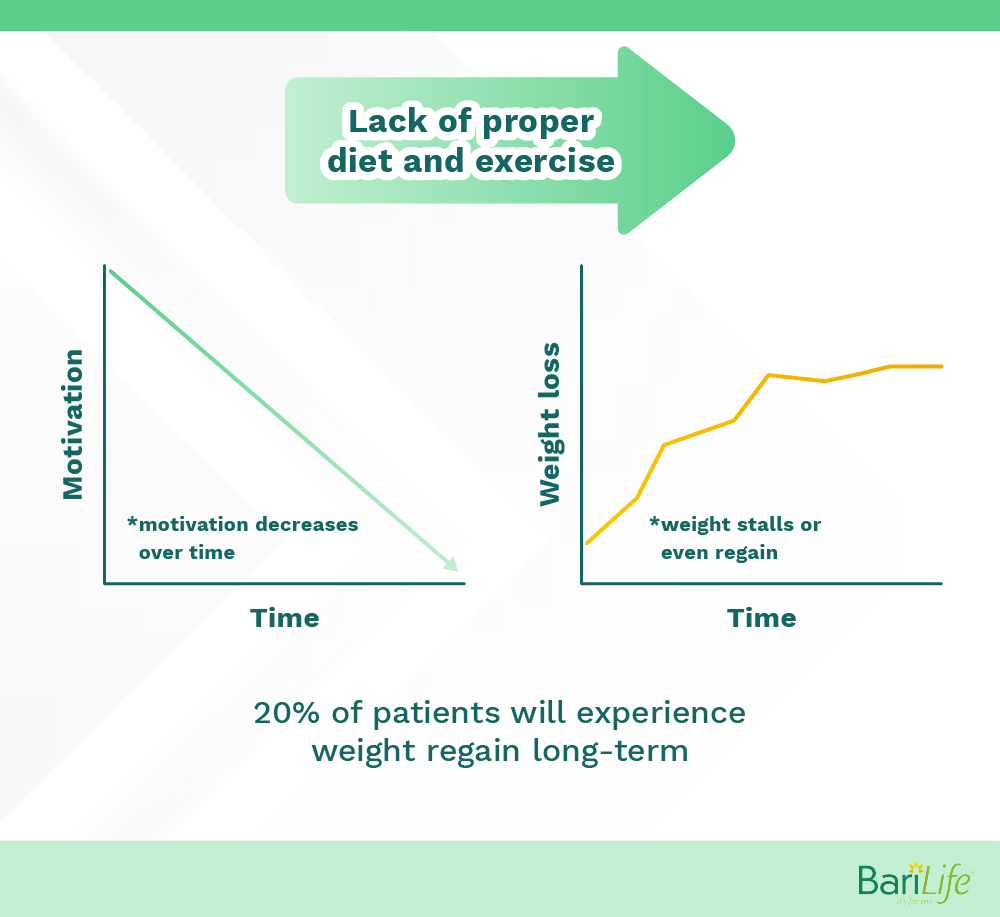
Plateaus in weight loss are normal after gastric bypass, and they happen frequently among many patients. It’s important to be aware of this before going into surgery. Being aware of the potential for weight loss plateaus and weight regain helps prepare you for what to do when they happen.
When weight loss stalls, your doctor may recommend something called the Jump Start Diet to help you get back on track.
Studies have shown that depending on a patient’s diet, the stomach can potentially expand in the years after gastric bypass, and this is a good predictor of weight regain. Although the evidence does not suggest that the Jump Start Diet will shrink the size of the pouch, it is believed that it can reset hunger levels, help you return to better eating habits, and increase weight loss.
The Jump Start Diet is a short-term, low volume, high protein diet that can be done over the course of 2 weeks or 5 days. At Bari Life, we recommend a diet with small portions, low calories, and high protein. Read more specifics on the Jump Start Diet here.
The Jump Start Diet is not a long-term diet or a quick fix. It is intended to help you get back on track and return to the previous lifestyle changes you were so motivated to do when you first received gastric bypass. After following the Jump Start Diet, you will still need to maintain a healthy diet and engage in regular physical activity to promote continued weight loss and maintenance.
Long-term diet after gastric bypass
Long-term dietary changes are crucial to continued weight loss and weight maintenance after gastric bypass. It’s important to maintain proper portion control and stick with healthy foods.
Recommended foods include fruits, vegetables, lean protein (fish, poultry, legumes, eggs, nuts, seeds), high-fiber bread and cereal products, and low-fat dairy. Foods that should be avoided are foods that are high in calories, sugar, and fat.
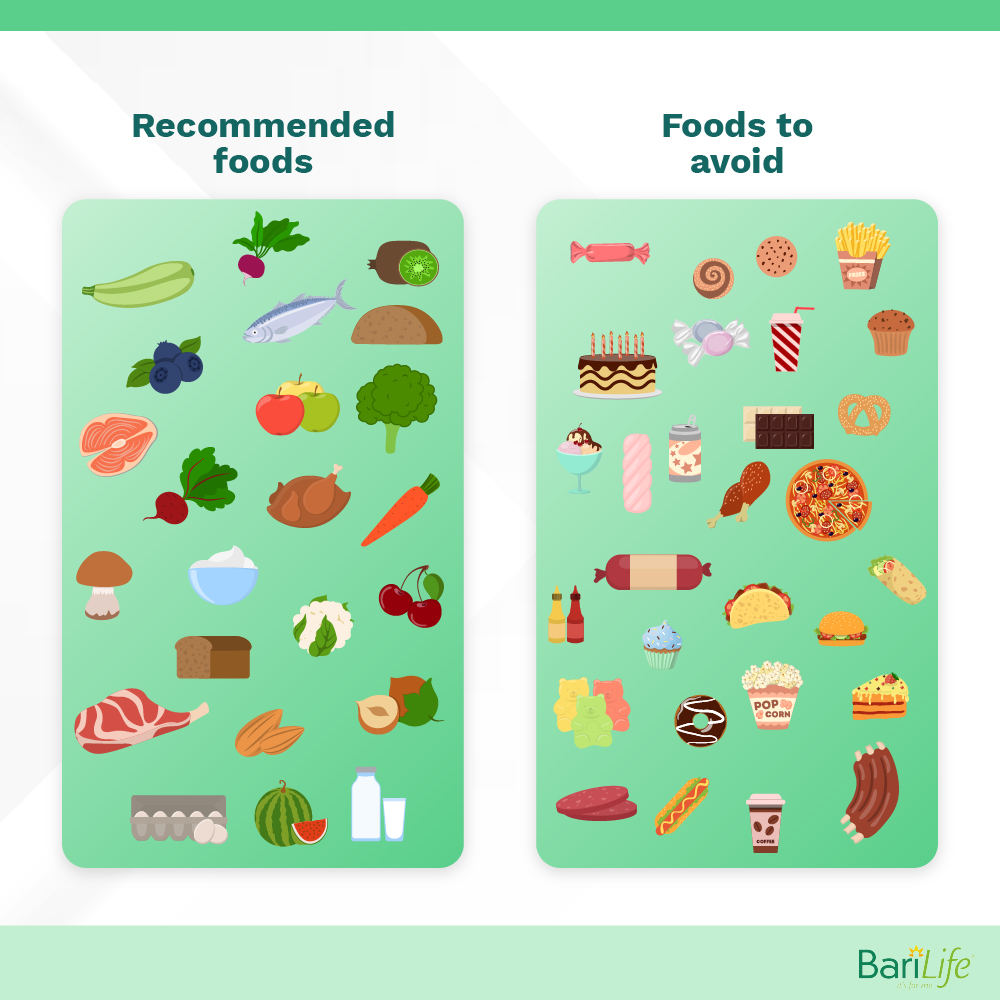
Excessive snacking is another issue that can hinder long-term weight loss if uncontrolled. People who snack frequently or graze throughout the day have a higher caloric intake, resulting in reduced weight loss and increased risk for weight regain.
Eating well-balanced meals spaced evenly throughout the day can increase long-term satiety and reduce the risk of overeating due to snacking.
Long-term exercise after gastric bypass
Recent studies suggest that exercise after gastric bypass surgery may encourage additional improvements in metabolic health compared to surgery alone. In addition to facilitating long-term weight loss after gastric bypass, physical activity provides a variety of health benefits such as the reduced risk of coronary heart disease, hypertension, diabetes, stroke, some cancers, and depression. Exercise improves bone health, helps with energy balance, and weight management.
Research suggests a minimum of 60 minutes of moderate to vigorous physical activity per day in order to produce and maintain significant long-term weight loss. This 60 minutes of activity can be done all at once or separated throughout the day.
Your exercise routine should include both muscle-building resistance training and cardiovascular exercise. Resistance training can help maintain muscle mass while following a calorie-restricted diet. It also improves muscular strength and endurance which will help you become more physically active. Start with 2-3 days of resistance training per week.
Cardiovascular exercise (walking, biking, swimming) increases your calorie expenditure while improving the health of your heart and lungs. This kind of exercise should be done every day.
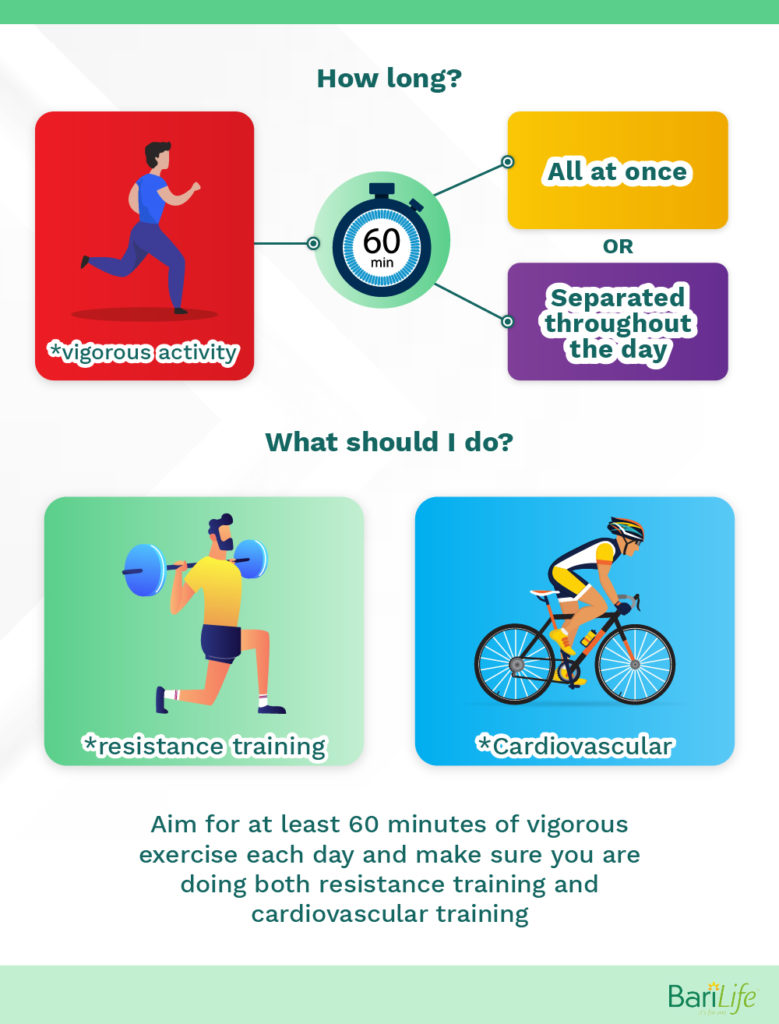
Try this simple workout routine you can start today
Using light dumbbells, perform the following exercises:
Bicep curl – 10 – 15 repetitions
Overhead shoulder press – 10 – 15 repetitions
Lateral shoulder raise – 10 – 15 repetitions
Using just your body weight, perform the following exercises:
Squat to chair – 10 – 15 repetitions
Step up on a small stool or stair – 10 – 15 repetitions
Incline plank on table or wall – hold for as long as you can
After performing the above exercises, walk for 30 minutes.
For the first week, start with 1 set of each exercise. In the second week, perform 2 sets of each exercise. In the third week, do 3 sets.
*Always consult a physician before starting an exercise program.
Key takeaways
After gastric bypass, many patients can expect to lose about 17% of excess weight during the first month. This seemingly easy weight loss typically continues for about 6 months during what is known as the “honeymoon phase.”
After the “honeymoon phase,” weight loss often stalls, and some patients may even regain some of the weight they lost.
Long-term habits are the most effective way to achieve continued weight loss and maintenance for life. Eating a healthy diet, following good portion control, and engaging in regular challenging physical activity can help you continue to reach your weight loss goals.
Remember that weight loss plateaus and weight regain after gastric bypass is normal. Assessing your diet and exercise habits and adjusting accordingly will help you overcome these challenges.




What kind of vitamin do you have for patients that have had the DS surgery
Hi there! We have a couple of options for you! First we have our Complete Vitamin Formula products. These vitamins have everything you need to meet DS post-op requirements. This is available in a swallowable tablet form and a powder drink mix.
Alternatively you can look at our Just One multivitamin with iron. As a DS patient, you’d need to take 1.5 tablets per day. Check it out here
Something to note about the Just One is that it does not have any calcium, which you need. So you can add our calcium chews here, or get calcium somewhere else – just make sure it’s calcium citrate (not carbonate).